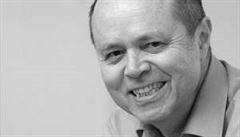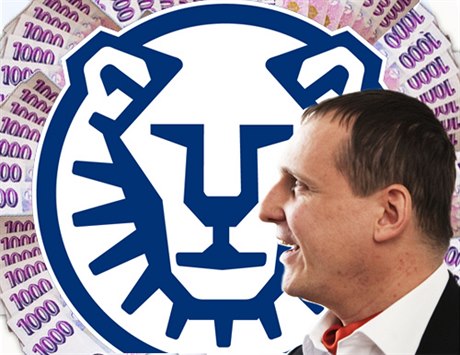Public Affairs (VV) de facto leader Vít Bárta, who resigned as transport minister on Friday in the wake of allegations of corruption and further evidence that the security firm he founded had spied on politicians, recently performed a “financial striptease,” so to speak, in the name of transparency in government. What he didn’t reveal is how he partly avoided paying corporate income tax via some creative remuneration and accounting practices.
Bárta said that between 2008 and 2010 he and his brother received in various forms a gross amount of around Kč 38 million as co-owners of ABL. When it comes to such sums, health and social insurance charges are — because of the maximum amounts set — a relatively negligible item and, moreover, the revealed net income corresponds with the 15-percent flat tax for physical entities.
Let’s assume, although this has not been explicitly stated, that Bárta took a brotherly approach to sharing the money with his brother Matěj and as ABL’s then 50 percent-owner Matěj Bárta was therefore remunerated along similar lines and in a similar way. If this was the case — and assuming there is no reason to question the truthfulness of the provided information — nothing remains but to congratulate both gentlemen on having built up such an excellent company and also to conclude that they, being physical entities, have no tax obligations toward the state.
How did ABL meet its tax obligations?
In the given period, ABL, a limited liability company, recorded an average annual profit of roughly Kč 13.5 million before taxes. And this is where the dilemma starts. As was already mentioned, in the referred-to period a 15-percent flat tax was applicable for physical entities. Now, the problem is that some company owners seemed to make out this flat tax and the ceiling to social and health insurance charges to be tantamount to an abolishment of corporate taxes. Company owners like the Bárta brothers started to sneak out most of their companies’ profits by paying out salaries or remuneration
Company owners like the Bárta brothers started to sneak out most of their companies’ profits by paying out salaries or remuneration for members of their statutory bodies of a completely different dimension than the recompense managers working for shareholders of other companies were receiving.
Substance over form is the legal principle applicable in the Czech Republic. Loosely interpreted, this means that it does not matter how a legal procedure is formally called but rather what its concrete contents is. In this particular case, this could also be interpreted as follows: Although no one can tell company owners what amount in remuneration they should pay out to themselves, if remuneration proves clearly out of proportion to what other managers in comparable positions in a similar sector are paid, then the company concerned cannot put the excessive part of the amount forward as an expense.
In such cases it will be necessary for the given company to upwardly re-adjust its profit — if need be retroactively — and pay the corresponding income tax for legal entities and, of course, also dividend tax as, according to the aforementioned legal principle, all money paid out to the owners of a company in excess of a commensurate remuneration should be considered as dividends — this in spite of the company owners calling the sum of money concerned a salary or remuneration.
Supplementary tax liability
Czech Position asked large companies involved in similar activities as ABL what the salaries and remuneration for their general directors and CEOs amount to. Nowhere did we hear of a higher sum than Kč 200,000 per month and Kč 2 million for annual bonuses. According to this information, it is possible to assess that the maximum annual income for a manager with a similar position — who, at the same time, does not happen to be the owner of the company — amounts to 200 000 x 12 plus Kč 2 million, i.e., Kč 4.4 million a year.
The Bárta brothers earned (if it is really the case that Matěj made as much as Vít Bárta) 2 x Kč 38 million, i.e., Kč 76 million in three years. When it comes to the company, only Kč 4.4 million x 2 x 3, i.e. Kč 24.4 million would be admissible. In which case, the profit calculated according to the income tax law over the given three years could be higher by up to 76 minus Kč 24.4 million, i.e. by up to Kč 51.6 million. ABL could be faced with an additional tax liability of Kč 10 million in income tax and Kč 7.7 million in dividend tax.
The average corporate tax rate over the given period was 20 percent and the average dividend tax rate 15 percent. Thus ABL could be faced with an additional tax liability of Kč 10 million in income tax and Kč 7.7 million in dividend tax. So, altogether that would amount to Kč 17.7 million in additional taxes, not including sanctions for delayed payments (we are not considering any possible repercussions from a criminal law perspective here).
We have also addressed several companies whose owners work for the company in various capacities. In at least one instance, we were told that a similar transfer of the company’s profit directly into individual remunerations had been planned — but was subsequently abandoned after explicit warnings from their tax adviser and an auditor. After having been informed on how ABL has been taxed, they now rather regret their decision.
The case of ProMoPro
None of the addressed tax advisers was prepared to comment officially on this matter. Comparing the actions of ABL and ProMoPro in this regard is very interesting. Our writings on ProMoPro have not exactly been flattering where other themes are concerned, but when it comes to this aspect the owners of that company have, compared to ABL, acted in an exemplary fashion.
ProMoPro achieved a profit in 2009 of Kč 64 million and the owners (a husband and wife) “only” paid out Kč 8 million to themselves in salaries and bonuses — per year and per person — less than we have calculated with respect to the Bárta brothers. But if they instead would have pulled the “Bárta trick,” they could have saved almost Kč 22.4 million in taxes.
Czech Position asked Vít Bárta to comment on our assessment but the now former transport minister did not react to our questions.
See related article: Bárta resigns as minister, still seeks top VV post





